Pope Felix.—Who is “Pope Felix,” mentioned in AElfric’s Homily on the Birthday of St. Gregory? AElfric, in speaking of the ancestors of St. Gregory, states that “Felix se eawfaesta papa waes his fifta faeder,”—“Felix the pious pope was his fifth father,” (i.e. great grandfather’s grandfather).
E.M.B.
April 15. 1850.
“Where England’s Monarch,” and “I’d preach as though.”—Will any of your subscribers have the kindness to inform me who was the author of the lines
“Where England’s monarch all
uncovered sat
And Bradshaw bullied in a broad-brimm’d
hat.”
And also of these, quoted by Henry Martyn as “well-known:”
“I’d preach as though I ne’er
should preach again,
I’d preach as dying unto dying men.”
H.G.
Milford, April 15. 1850. {416}
Latin Epigram.—I should be much obliged to any of your readers who can inform me who was the author and what is the date of the following epigram. The peculiarity of it, your readers will observe, consists in the fact, that while read directly it contains a strong compliment; yet it is capable of being read backwards, still forming the same description of verse, but conveying a perfect reverse of the compliment:—
“Laus tua, non tua fraus; virtus
non copia rerum,
Scandere te fecit hoc decus
eximium,
Pauperibus tua das; nunquam stat janua
clausa;
Fundere res quaeris, nec tua
multiplicas.
Conditio tua sit stabilis! non tempore
parvo
Vivere te faciat hic Deus
omnipotens.”
When reversed, it reads thus:—
“Omnipotens Deus hic faciat te vivere
parvo
Tempore! Non stabilis
sit tua conditio.
Multiplicas tua, nec quaeris res fundere;
clausa
Janua stat, nunquam das tua
pauperibus.
Eximium decus hoc fecit te scandere rerum
Copia, non virtus; fraus tua,
non tua laus.”
Any additional information would much oblige.
O.
April 15. 1850.
* * * * *
REPLIES.
GRAY’S ALCAIC ODE.
Circumstances enable me to give a reply, which I believe will be found correct, to the inquiry of “C.B.” in p. 382. of your 24th Number, “Whether Gray’s celebrated Latin Ode is actually to be found entered at the Grande Chartreuse?” The fact is, that the French Revolution—that whirlwind which swept from the earth all that came within its reach and seemed elevated enough to offer opposition—spared not the poor monks of the Chartreuse. A rabble from Grenoble and other places, attacked the monastery; burnt, plundered, or destroyed their books, papers, and property, and dispersed the inmates; while the buildings were left standing, not from motives of respect, but because they would have been troublesome and laborious to pull down, and were not sufficiently combustible to burn.




